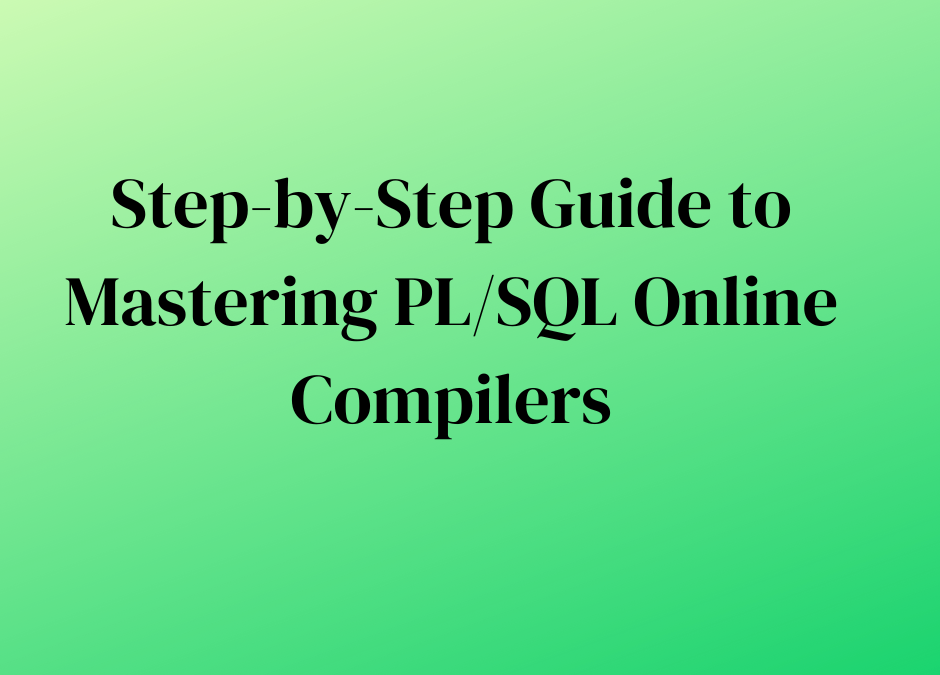The Ultimate Step-by-Step Guide to Mastering PL/SQL Online Compilers
Understanding PL/SQL Online Compilers
PL/SQL (Procedural Language/Structured Query Language) online compilers provide a convenient platform for developers to write, execute, and test PL/SQL code without installing any software locally. These platforms offer an integrated development environment (IDE) that includes a code editor, compiler, and sometimes even debugging tools.
Key Points to Explore:
- Features and Functionality: Discuss the primary features typically offered by PL/SQL online compilers, such as syntax highlighting, code completion, error checking, and database connectivity options. Explain how these features aid developers in writing and debugging code more efficiently.
- Accessibility and Convenience: Highlight the advantages of using online compilers, emphasizing accessibility from any device with an internet connection. Discuss the convenience of avoiding local installations and the flexibility it offers for collaborative work.
- Security Measures: Address common concerns about security when using online platforms for coding. Explain the security measures implemented by reputable PL/SQL online compiler providers to safeguard user data and code integrity.
- Comparison with Offline Environments: Compare and contrast the experience of using online compilers versus traditional offline environments, showcasing the unique advantages and potential limitations.
Oracle is a computer software and hardware company. They are the world’s second largest software maker.we are providing best oracle job placement will be provided with new updated syllabus with 15 years experience facallty.
Getting Started with a PL/SQL Online Compiler
To begin utilizing a PL/SQL online compiler effectively, users need to understand the initial steps involved in accessing, setting up, and navigating the platform.
Key Points to Explore:
- Registration and Account Setup: Guide users through the registration process, if required, highlighting the importance of creating an account for personalized features and enhanced functionality.
- User Interface Overview: Provide a comprehensive tour of the user interface, emphasizing the location of essential tools such as the code editor, execution environment, and additional resources or settings.
- Creating and Running Code: Explain the step-by-step process of creating a new code file, entering PL/SQL code, and executing it within the online compiler. Include examples and screenshots to aid comprehension.
- Interpreting Output and Error Handling: Discuss how users can interpret the output generated by the compiler and handle errors effectively, offering troubleshooting tips and best practices.
Advanced Techniques and Optimization Strategies
Beyond basic functionalities, mastering a PL/SQL online compiler involves delving into advanced techniques and optimization strategies to enhance coding proficiency.
Key Points to Explore:
- Utilizing Advanced Features: Detail the utilization of advanced features within the compiler, such as database connectivity, stored procedures, functions, and triggers. Provide examples to illustrate these concepts.
- Performance Optimization: Discuss techniques for optimizing PL/SQL code for better performance, including query optimization, indexing strategies, and minimizing resource consumption.
- Debugging and Testing: Explain debugging tools available within the compiler and best practices for effective testing and troubleshooting of PL/SQL code.
- Version Control and Collaboration: Touch upon collaborative features and version control options available in some online compilers, enabling team collaboration and code management.
Integrating Real-World Scenarios
Real-world applications and case studies offer valuable insights into applying PL/SQL online compilers in practical scenarios, showcasing their effectiveness in various contexts.
Key Points to Explore:
- Industry-Specific Use Cases: Present case studies from different industries (finance, healthcare, e-commerce, etc.) demonstrating how organizations leverage PL/SQL online compilers for specific projects or challenges.
- Problem-Solution Approach: Discuss how developers solved complex problems or optimized processes using PL/SQL online compilers. Highlight the challenges faced and the innovative solutions implemented.
- Success Stories: Share success stories or testimonials from developers or teams who significantly benefited from utilizing these compilers, emphasizing the impact on productivity and project outcomes.
- Lessons Learned and Best Practices: Summarize the key takeaways and best practices derived from these case studies, offering actionable insights for readers to apply in their own projects.
Exploring Resources and Community Support
A thriving community and access to resources can significantly enhance the learning curve and mastery of PL/SQL online compilers.
Key Points to Explore:
- Documentation and Tutorials: Highlight the availability of comprehensive documentation, tutorials, and guides provided by the compiler platform or the community, aiding users in learning and troubleshooting.
- Forums and Discussion Boards: Discuss the significance of active forums and discussion boards related to PL/SQL and online compilers, encouraging readers to engage, ask questions, and share knowledge.
- Learning Paths and Courses: Recommend online courses, webinars, or learning paths tailored to mastering PL/SQL online compilers, providing readers with additional educational resources.
- Contributing to the Community: Encourage readers to contribute to the community by sharing their experiences, code snippets, or insights, fostering a collaborative environment for continuous learning.

